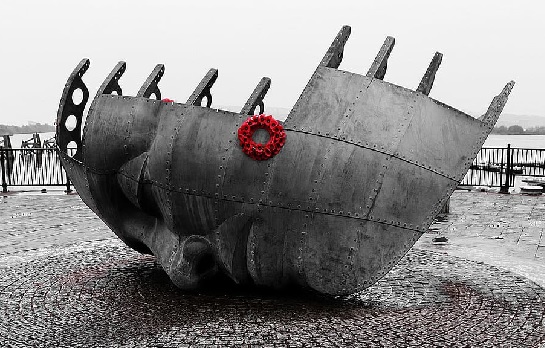
The Merchant Seaman's Memorial in Cardiff
Arts Council of Wales: ‘Don’t tell us you’re underfunded’
Welsh arts organisations have been told to model for a 10% funding cut amid the council’s drive to reach new audiences.
Welsh arts organisations that complain of being underfunded risk losing access to funding altogether, the Arts Council of Wales (ACW) has warned.
Planning guidance released on Monday says “equality and diversity are the touchstones” of the funder’s five-year Investment Review and that aspiring portfolio organisations for 2021 must demonstrate leadership on inclusion, social justice and promoting the Welsh language: “We know it’s a big ‘ask’ but the fact that real change is needed is, we believe, inarguable. What we want to see won’t be achieved at the flick of a switch.”
But ACW has also signalled a bleak future for organisations struggling on current levels of funding, saying that “our room for manoeuvre will be extremely limited” by a probable freeze in Welsh Government funding.
It warned organisations to “think very carefully” before applying for additional funding on the basis that they’re underfunded.
READ MORE:
“Applications that suggest that they cannot continue without very significant funding increases risk the very real possibility that we will have no option but to exclude them from the future Arts Portfolio Wales.”
The council, wary of implying funding would be cut, has nonetheless advised organisations to model for reductions of 10%.
“We’re sorry to give such a down-beat assessment and we will, of course, continue to press for the levels of public funding that we believe the arts in Wales deserve. But we must also recognise the wider context.
“In a static funding environment there will be winners and losers in terms of funding.”
Reaching out
Consultation on the Investment Review unearthed concerns that ACW’s insistence on widening engagement would harm the quality of organisations’ work: “We recognise the view but don’t accept it,” the funder says.
It wants the new portfolio to “reach more widely across the full range of the Welsh public than is currently the case”. Though efforts to widen audiences have long been central to ACW’s funding policies, it says the benefits of public arts funding “remain stubbornly limited to a small proportion of the population, usually the wealthiest, better-educated and least ethnically diverse”.
“When looking at the totality of the potential portfolio … these are matters that we will need to take account of in our final decision-making,” ACW says.
Acknowledging that organisations’ ability to change their geographic location or primary activities are limited, it said those that explain how they will reach new audiences “will be well-placed to argue that they’re reflecting Council’s priorities”.
And they may receive more money to do it: “We are willing to consider uplifts to organisations that can show exceptional and realistic opportunities to increase their reach to a more diverse audience.”
Value for money
Organisations will also have to convince ACW that they provide increasingly good value for money.
How this will be measured is open to interpretation. The funder notes “assessing value for money in the arts can be a difficult and contentious issue” and the proof organisations give “may not just be in terms of £/person”. Those who offer more depth of engagement with fewer people can argue that the scale or impact of their practice “still represent a good investment”.
ACW expects organisations to work collaboratively with their communities – addressing cultural poverty and social exclusion should be “explicitly addressed” in portfolio organisations’ planning. It says it is open to “imaginative approaches” to this, including collaborations within and across sectors.
But it has warned against collaboration for the sake of it: “We see no merit in ‘shot-gun weddings’ that have neither an artistic nor a financial rationale.”
Join the Discussion
You must be logged in to post a comment.